TeamUp activities enhnacing PlayMatters' Goal of Children's Holistic Development
Through play-based activities, TeamUp equips learners with skills such as communication, confidence, critical thinking and creates emotional and mindful awareness.
May 08, 2024
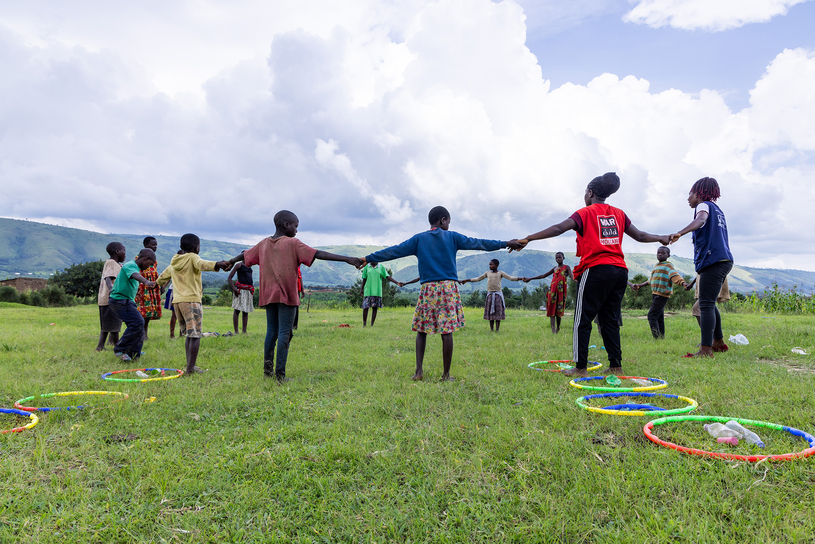
In January 2023, Angela, a 14-year-old pupil, embarked on a transformative journey by joining TeamUp activities at St. Joseph’s Kyabirikwa Primary School in Isingiro District, western, Uganda. Despite the school being closed for holidays at the time, TeamUp facilitators extended their reach into the communities, allowing Angela and her siblings to participate alongside other children from the community.
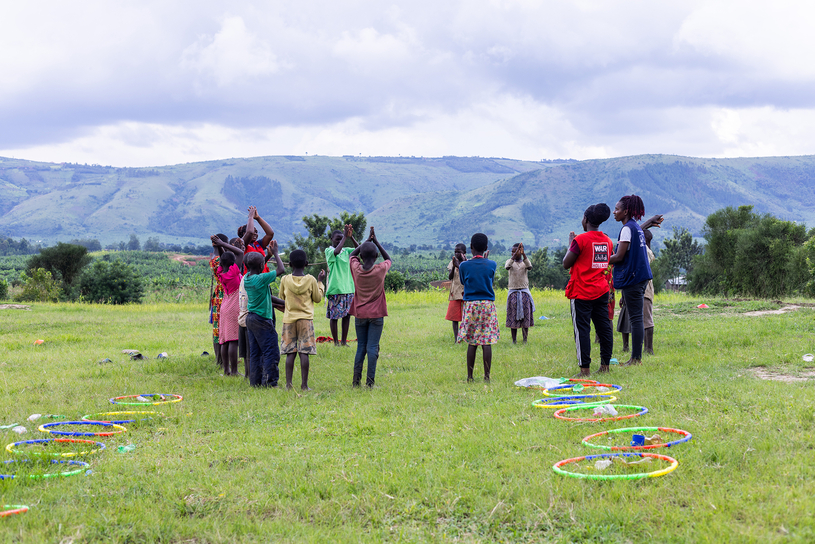
Angela (in a green T-shirt and skirt) joins other children from her community in a TeamUp session in Isingiro District_Western_Uganda. Angela says TeamUp has helps her to feel happy whenever she is sad.
Equipped with balls and colorful cones, each TeamUp session commences with games played in groups of five. For Angela, TeamUp became more than just a recreational activity—it became a source of joy, and valuable life lessons. Through TeamUp, she forged new friendships, found joy after moments of sadness, and learnt crucial values like sharing and respecting elders.
“The teacher taught us how to make new friends. I had only one friend before TeamUp but now I have up to 10!” Angela said.
Watch this!
PlayMatters focuses on the holistic development of a child and especially learning through play. TeamUp is structured mental health and psychosocial support and play-based activity which allows a child to learn even outside the classroom. As they learn, they are developing specific skills such as communication, confidence, critical thinking (the 3Cs), and creating emotional and mindful awareness using the TeamUp games. TeamUp is another way of promoting Learning through Play (LtP) beyond the classroom. At Kibwera Primary School, a total of 509 children participates in TeamUp activities.
On the project, TeamUp is implemented by WarChild Holland, a partner on the PlayMatters consortium which is led by the International Rescue Committee and includes Plan International, WarChild Holland, The Behavioural Insights Team and Innovations for Poverty Action. This initiative aims to harness the power of play to enhance children's holistic development, mental well-being, and learning. In western Uganda, TeamUp is implemented in eight schools in Nakivale and Oruchinga Valley Refugee Settlements which are made up refugees from different countries including Rwanda, Burundi, DR Congo, Ethiopia, and Eritrea.
Supporting learners’ psychosocial well-being
At school, Angela's environment was challenging before TeamUp. Classmates would mock her academic achievements, undermining her efforts and making her feel bad. With the introduction of TeamUp, a positive shift occurred. Fellow learners developed the attitude of mutual support and encouragement for one another. Rather than ridicule, Angella now receives constructive feedback and motivation from her peers.
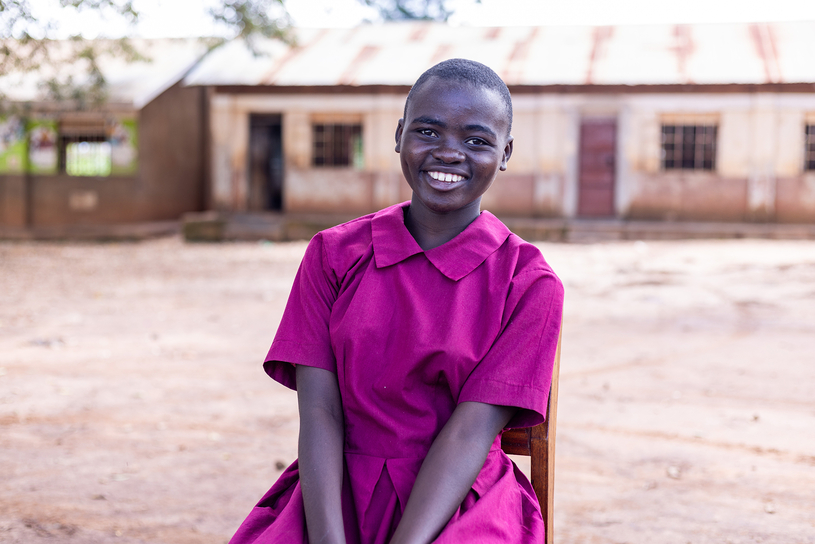
Angela says TeamUp became more than just a recreational activity—it became a source of joy, and valuable life lessons.
“Before TeamUp, pupils would laugh at those who scored 50 marks in an exam saying how can they score such marks, yet they study every day. But now when you score a low mark, fellow pupils encourage you to revise hard and get better marks,” she says.
Monica, a project officer under the PlayMatters project, indicates that TeamUp has improved learners’ psychosocial wellbeing. “We are dealing with learners coming from conflict-affected countries who come to school with stress and depression because of memories of the war. When they come and interact with others, TeamUp becomes a healing process and they start looking forward to coming to school,” she said.
The TeamUp games are crucial in creating friendship, unity, peace, and serenity among these children who come from different walks of life. Monica states that a game like relays where a child must strategise to pass a baton (stick) teaches children to learn to work as a team.
What is a TeamUp session comprised of
The major aspect of a TeamUp session is the game. In this game there is physical movement, eye contact, singing, and communication. The opening part is usually a song (follow the leader) as children come out of the classroom, or from homes when in the community. The instructions are usually both verbal and non-verbal which encourages concentration. There is a theme for every game; for instance, a theme of friendship which encourages interaction. Then there is a cool down from the game; an activity that is meant for an evaluation where the facilitator gets feedback from the children. Sometimes this feedback informs what will happen in the next session.
“If during the sessions, we notice a child who is withdrawn or maybe cannot talk confidently, we keep an eye on them trying to see if they are improving. For instance, there is a child who had issues with another because they had thrown a stone at them. Once grouped together in a session, they ended up playing and resolving the conflict,” Monica said.
TeamUp beyond the school
Beyond the school setting, TeamUp transcends into the community, ensuring continuous engagement with children during holidays. Here, all children get the chance to benefit from the games beyond those in the TeamUp implementing schools. “When schools close, we go ahead and engage the children in the community because TeamUp looks at the psychosocial wellbeing of the children. In the community we don’t limit who participates. In fact, children who are not in TeamUp schools are always looking forward to holidays to take part in the sessions,” Monica says.
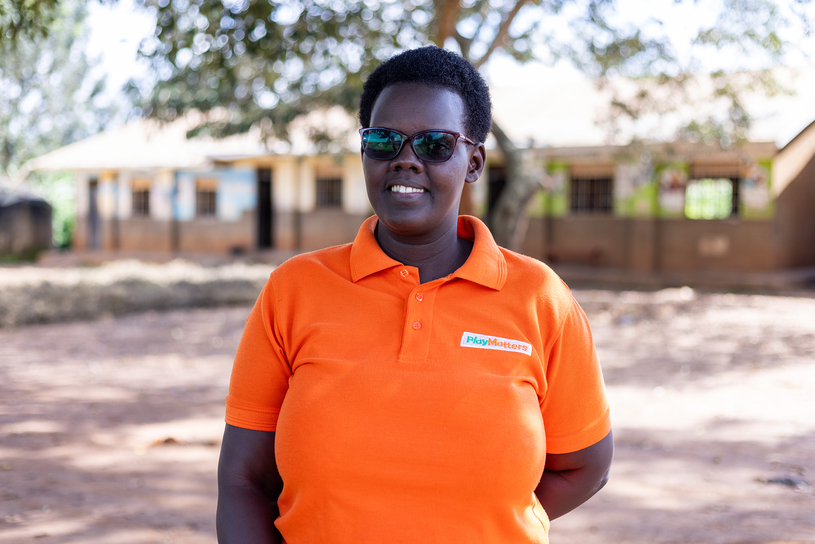
Monica, a project officer under the PlayMatters project, says TeamUp has improved learners’ psychosocial wellbeing.
Gloria, a TeamUp facilitator at Kibwera Primary School, attested to the transformative impact of TeamUp, emphasizing its role in bridging divisions and fostering happiness among children. She says, by tailoring activities to address issues like anger and social isolation in children, TeamUp not only provides a platform for physical recreation but also serves as a catalyst for emotional healing and social integration. “In classes you would find that refugees sit alone and host community children alone. Now they share the same seats and food,” Gloria says.
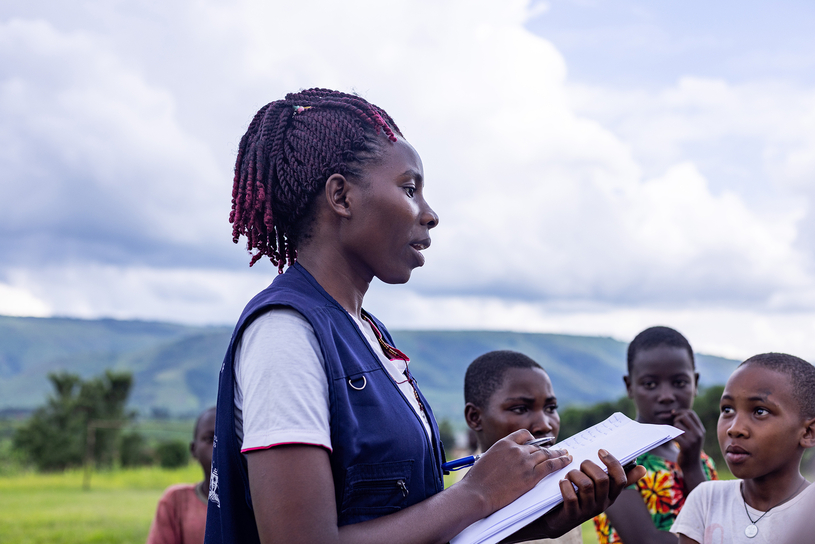
Gloria, a TeamUp facilitator at Kibwera Primary School, leads children in sessions everyday where she identifies children that need psychosocial support.
In essence, TeamUp has emerged as a beacon of positivity and inclusion, enriching the lives of children like Angela, and paving the way for a brighter, more cohesive future within the community. In Isingiro District, 6,474 children from the refugees and host community have so far benefitted from TeamUp activities.